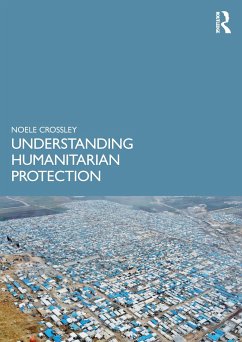
Advocacy Networks and the Responsibility to Protect
The Politics of Norm Circulation
Versandkostenfrei!
Versandfertig in 6-10 Tagen
43,99 €
inkl. MwSt.
Weitere Ausgaben:

PAYBACK Punkte
22 °P sammeln!
This book contributes to existing debates on the Responsibility to Protect (R2P) by demonstrating new advocacy strategies and the greater interconnectedness of various R2P proponents.In 2021, the UN General Assembly adopted a new resolution on R2P, which reaffirmed its commitment from the 2005 World Summit Outcome and put R2P on the annual agenda. For many R2P proponents, this was another manifestation of worldwide R2P relevance and of growing support among UN members to protect people from genocide, war crimes, ethnic cleansing and crimes against humanity. Yet the existing crises in Myanmar, ...
This book contributes to existing debates on the Responsibility to Protect (R2P) by demonstrating new advocacy strategies and the greater interconnectedness of various R2P proponents.
In 2021, the UN General Assembly adopted a new resolution on R2P, which reaffirmed its commitment from the 2005 World Summit Outcome and put R2P on the annual agenda. For many R2P proponents, this was another manifestation of worldwide R2P relevance and of growing support among UN members to protect people from genocide, war crimes, ethnic cleansing and crimes against humanity. Yet the existing crises in Myanmar, Venezuela, Belarus, Syria and many others revealed the widening gap between the discourse and practice. This book aims to find out what keeps the concept alive despite its indisputable pitfalls. In contrast to existing studies that treat the R2P endorsement or contestation as intertwined processes of norm evolution, it argues that the status of R2P has been accomplished by the conscious politics of its advocates operating in complex global networks. As such, the book puts emphasis on the agency of R2P champions and examines who keeps the idea resonating and how they manage to preserve its worldwide relevance. Rather than proposing a new model of advocacy, the book aims to pinpoint the politics of R2P's circulation, the importance of individual R2P champions and their interconnectedness through innovative forms of cooperation within complex networks.
This book will be of much interest to students of the R2P, diplomacy, human rights, foreign policy and International Relations.
In 2021, the UN General Assembly adopted a new resolution on R2P, which reaffirmed its commitment from the 2005 World Summit Outcome and put R2P on the annual agenda. For many R2P proponents, this was another manifestation of worldwide R2P relevance and of growing support among UN members to protect people from genocide, war crimes, ethnic cleansing and crimes against humanity. Yet the existing crises in Myanmar, Venezuela, Belarus, Syria and many others revealed the widening gap between the discourse and practice. This book aims to find out what keeps the concept alive despite its indisputable pitfalls. In contrast to existing studies that treat the R2P endorsement or contestation as intertwined processes of norm evolution, it argues that the status of R2P has been accomplished by the conscious politics of its advocates operating in complex global networks. As such, the book puts emphasis on the agency of R2P champions and examines who keeps the idea resonating and how they manage to preserve its worldwide relevance. Rather than proposing a new model of advocacy, the book aims to pinpoint the politics of R2P's circulation, the importance of individual R2P champions and their interconnectedness through innovative forms of cooperation within complex networks.
This book will be of much interest to students of the R2P, diplomacy, human rights, foreign policy and International Relations.














